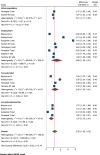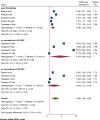Early cessation of exclusive breastfeeding and associated factors in Ethiopia: a systematic review and meta-analysis
- PMID: 40395551
- PMCID: PMC12089787
- DOI: 10.3389/fnut.2025.1500077
Early cessation of exclusive breastfeeding and associated factors in Ethiopia: a systematic review and meta-analysis
Abstract
Background: Early cessation of exclusive breastfeeding poses significant risks to infant health by depriving them of essential immune-boosting and nutritional benefits found in breast milk. The First 1,000 Days, from conception to a child's second birthday, is a critical window for growth and development. EBF during this period plays a vital role in ensuring optimal nutrition, strengthening immunity, and reducing childhood morbidity and mortality. However, early discontinuation of EBF remains a major public health concern in Ethiopia, contributing to malnutrition and increased susceptibility to infections.
Aim: Despite global efforts to promote exclusive breastfeeding, early cessation remains a growing concern. This systematic review and meta-analysis assess the prevalence and associated factors of early cessation of EBF to provide evidence-based insights for improving breastfeeding practices.
Methods: We conducted a comprehensive search of published papers in Scopus, PubMed, Google Scholar, and Web of Science databases, up to March 1, 2024, without any restrictions on publication date. Records were screened, data extracted, and the risk of bias was independently assessed by five reviewers. Study heterogeneity was evaluated using Cochrane I2 statistics, while publication bias was assessed through the Egger-Begg test and funnel plots. A random-effects model was used to estimate the pooled prevalence of early cessation of EBF.
Results: The analysis included 3,726 participants from 9 studies: five cross-sectional, two case-control, and two cohort studies. The overall pooled prevalence of early cessation of EBF was 43.31% (95% CI: 27.30-59.32). Several factors were significantly associated with early cessation, including urban residence (OR = 2.01, 95% CI: 1.7-2.30), lack of maternal education (OR = 2.79, 95% CI: 1.86-3.72), maternal employment (OR = 2.88, 95% CI: 1.36-4.41), poor knowledge of breastfeeding (OR = 2.08, 95% CI: 1.45-2.70), delayed initiation of breastfeeding (OR = 2.88, 95% CI: 1.57-2.18), and being a first-time mother (OR = 2.08, 95% CI: 1.45-2.70).
Conclusion: The pooled prevalence of early cessation of EBF in Ethiopia was found to be 43.31% (95% CI: 27.30-59.32), indicating that nearly half of Ethiopian infants are not breastfed exclusively for the recommended 6 months. Factors significantly associated with early cessation include urban residence, non-educated mom, employment, poor maternal knowledge, delayed breastfeeding initiation, and Primipara (being a first-time mother). These findings underscore the need for targeted interventions, such as community-based education programs, workplace breastfeeding support policies, and strategies to promote early breastfeeding initiation and improve maternal knowledge. Addressing these factors could help reduce early cessation, increase sustained EBF rates, and improve child health outcomes.
Keywords: Ethiopia; breastfeeding; determinants; early cessation; exclusive breastfeeding.
Copyright © 2025 Emagneneh, Mulugeta, Alamrew, Ejigu and Abebe.
Conflict of interest statement
The authors declare that the research was conducted in the absence of any commercial or financial relationships that could be construed as a potential conflict of interest. The reviewer FWF declared a shared affiliation with the authors to the handling editor.
Figures







Similar articles
-
The effect of unemployment and post-natal care on the exclusive breast-feeding practice of women in Ethiopia: a systematic review and meta-analysis.Reprod Health. 2022 Apr 15;19(1):94. doi: 10.1186/s12978-022-01404-y. Reprod Health. 2022. PMID: 35428313 Free PMC article.
-
Undernutrition among exclusive breastfeeding mothers and its associated factors in Southwest Ethiopia: A community-based study.Womens Health (Lond). 2024 Jan-Dec;20:17455057241231478. doi: 10.1177/17455057241231478. Womens Health (Lond). 2024. PMID: 38390653 Free PMC article.
-
Systematic review and meta-analysis of the prevalence and determinants of exclusive breastfeeding in the first six months of life in Ghana.BMC Public Health. 2023 May 19;23(1):920. doi: 10.1186/s12889-023-15758-w. BMC Public Health. 2023. PMID: 37208682 Free PMC article.
-
Time to early cessation of exclusive breast feeding and associated factors among 6-12 months old children: Survival analysis.Clin Nutr ESPEN. 2022 Aug;50:283-288. doi: 10.1016/j.clnesp.2022.04.030. Epub 2022 May 12. Clin Nutr ESPEN. 2022. PMID: 35871937
-
Geospatial determinants and spatio-temporal variation of early initiation of breastfeeding and exclusive breastfeeding in Ethiopia from 2011 to 2019, a multiscale geographically weighted regression analysis.BMC Public Health. 2024 Jul 27;24(1):2011. doi: 10.1186/s12889-024-19552-0. BMC Public Health. 2024. PMID: 39068397 Free PMC article.
References
-
- Couto GR, Dias V, de Jesus Oliveira I. Benefits of exclusive breastfeeding: An integrative review. Nurs Pract Today. (2020) 7:245–54.
-
- Ribeiro JR, Antunes H. Andrology and gynecology reports World Health Organization (WHO) recommends exclusive breastfeeding in the first six months of life. Androl Gynacol. (2018) 82:1–6.
-
- ASEAN, UNICEF and Alive & Thrive . (2022). Guidelines and minimum standards for the protection, promotion and support of breastfeeding and complementary feeding. p. 3.
Publication types
LinkOut - more resources
Full Text Sources

